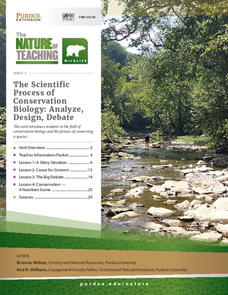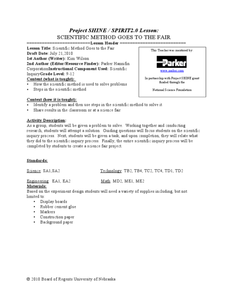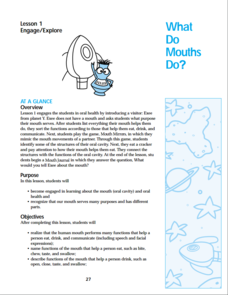Curated OER
Refining the Why? Turning Student Questions into Research
Middle schoolers have years of experience when it comes to how their bodies work. Surely they have some questions as well. Here is an opportunity for them to practice the scientific method in an attempt to answer some of those questions....
Purdue University
The Scientific Process of Conservation Biology: Analyze, Design, Debate
Scientists use data to learn about species survival—and your classes can too! A set of four lessons guides learners through a process to draw conclusions about the fluctuations in the population of the Hellbender species. They read...
Curated OER
Reviewing the Scientific Process
Students investigate the scientific method by reading science journals. In this scientific research instructional activity, students read several articles of the National Inquirer and analyze the specific parts of an article....
Scholastic
Study Jams! Investigations to Collect Data
Print out the lyrics or show the karaoke video to get your scientists singing about the scientific process! Participants will warble about observations and measurements, data and physical properties. Consider sharing this resource after...
Curated OER
Pond Ecology
A lab activity is a great way to incite thoughtful questioning and scientific processes. Pupils will collect organisms with a Petri dish, make observations, sketch the organism, ask questions, then attempt to identify the specimen...
Curated OER
Bird Ecology Unit
Birds, plants, and vegetation, is there anything more lovely? There is! Engage your class in the scientific process, data collection, and data analysis. They stroll their campus observing and identifying various birds and plants,...
Curated OER
Paradise Lost: Bloom’s Taxonomy of Thinking Processes
Chapter II of John Milton's Paradise Lost provides the text for a series of comprehension questions crafted using Bloom's Taxonomy.
Center Science Education
Field Projects: Science in Action
Cooperative groups select from one of four scenarios regarding hurricanes, greenhouse gases, thunderstorms, or the global climate domino effect. They discuss what kind of research needs to be conducted to address their chosen scenario...
Curated OER
Scientific Method Goes to the Fair
Students use scientific process skills to solve a problem. In this scientific investigation lesson, students investigate a scientific problem, work through the scientific method to form a conclusion. They share their work and findings...
Curated OER
Memorable Ways to Cover the Periodic Table
An exploration of the periodic table can lead to a discussion of the scientific process and the ways that our knowledge of this topic evolves and grows.
Curated OER
The Scientific Method
Students study the steps involved in the scientific method. They apply the scientific method to their science fair projects.
Towson University
Mystery Tubes
How do scientists know they're right? Truth be told, they don't always know. Explore the scientific process using mystery tubes in an insightful activity. Young scientists discover how to approach and solve problems in science, how ideas...
Curated OER
Things Fall Apart: Bloom's Taxonomy of Thinking Processes
One of the things that makes Bloom's Taxonomy so effective is that it works off different levels of understanding. Test your readers' knowledge, comprehension, application, analysis, synthesis, and evaluation with these short questions....
California Academy of Science
Composting: A Scientific Investigation: California Academy of Sciences
Garbage, recycle, compost: Does it really matter where we put our trash once we are done? By making detailed observations over seven weeks, kids will see which materials break down naturally to become a healthy part of the soil, and...
The Science Spot
Independent Investigation Guidelines
A neatly formatted outline of the steps of the scientific method can be used as a reference sheet for your future science fair participants. For each step, you will find a few guiding questions or points to remember when working on...
University of North Carolina
Scientific Reports
IMRAD isn't text-speak for I'm cool. It's actually the format for scientific reports. As part of a larger series on specific writing assignments, an informative handout explains the nuts and bolts of writing a lab report. First, however,...
Curated OER
Creating a Salad Dressing
Learners apply the scientific method to the act of creating a new salad dressing. In this scientific process lesson, students use the process to create personal salad dressing from the materials provided.
Discovery Education
Clutter Cutter
Challenge young learners to cut the clutter with this fun engineering project. As employees of a home and office supply company, young engineers are asked to develop devices that organize everyday items. After participating in a...
K12 Reader
The Scientific Method
Introduce the scientific method with a reading comprehension activity. Have kids read a few paragraphs that describe the process of making a hypothesis, gathering evidence, and taking notes that will support the experiment.
Institute for Energy and Environmental Research
Practice with Scientific Notation
Zeroes are more important than they look! A guided practice activity takes learners through the process of both scientific and decimal notation, culminating in more complex word problems and equations.
EngageNY
Operations with Numbers in Scientific Notation
Demonstrate the use of scientific notation within word problems. The lesson presents problems with large numbers best represented with scientific notation. Pupils use these numbers to solve the problems in the 11th installment in a...
National Institutes of Health
Open Wide and Trek Inside
Don't underestimate the value of a clean mouth! Here is a six-lesson unit that details everything a youngster needs to know about oral hygiene. It includes lessons on the purpose of a mouth and teeth, the nature of oral...
Curated OER
Wet or Dry Experiment
Practice the scientific process by testing whether mealworms prefer a wet or dry environment. This is an engaging experiment to use as an example of how to go through the steps of the scientific method. Elementary schoolers can work in...
Curated OER
Oil and its Everyday Uses
Explore the properties of oil through an experiment. They use the scientific process to investigate oil, participate in experiments, watch videos,and use information from the internet to determine how oil has changed our...

























